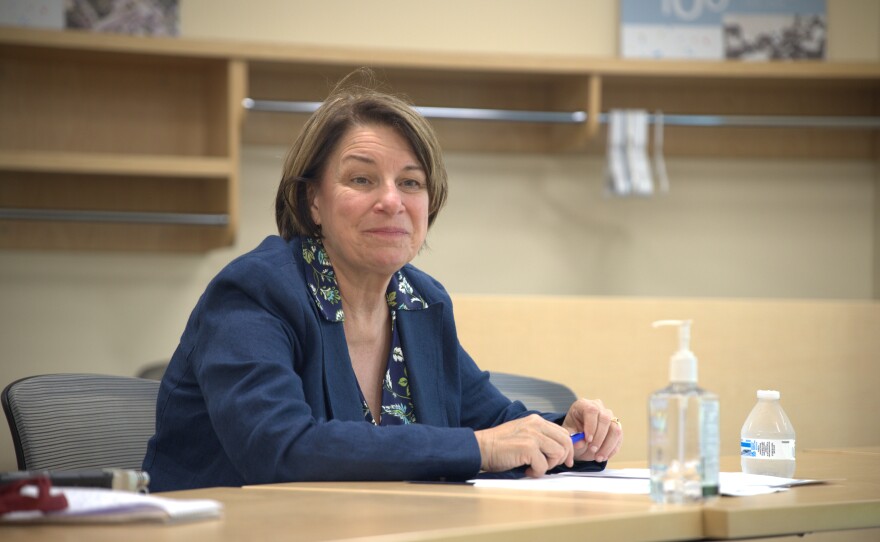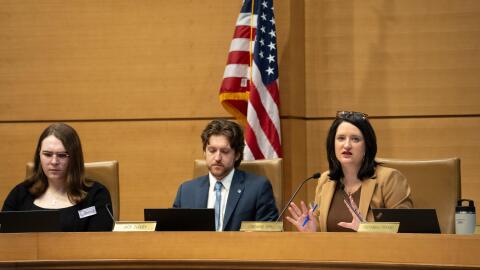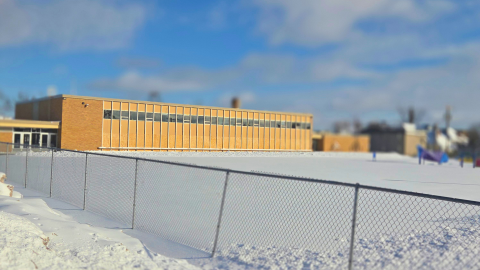GRAND RAPIDS — Sen. Amy Klobuchar visited Grand Itasca Clinic & Hospital in Grand Rapids on Friday, July 25, as federal cuts to Medicaid and Medicare loom on the horizon.
The Democratic senator joined Mayor Tasha Connelly on a tour around the hospital led by Jon Pederson, the hospital’s vice president of operations, and Jean MacDonell, president and CEO of Grand Itasca and Fairview Range in Hibbing. The tour included a focus on the hospital’s emergency room and birth clinic.
After the tour, Klobuchar sat down with the administration and the mayor to discuss the status of the hospital and other areas of the city.

Grand Itasca has seen higher numbers of patients in recent years, especially since the COVID-19 pandemic, as services end in other nearby facilities, MacDonell said. As baby delivery services stopped in International Falls and Deer River, for example, those patients now travel to Grand Itasca to give birth.
“We have increased OB [obstetrics] patients, increased ER [emergency room] patients, increased mental health patients,” MacDonell said. “We are growing out of this building, and with services closing in small facilities around us, we tend to absorb those patients.”
One of the hospital leaders’ biggest concerns is the facility’s ability to grow with the increase of patients in several areas of the hospital, including the ER, birth clinic and main family practice, Pederson said.
“We're seeing growth in all those areas, and we're starting to bust at the seams in that space,” he said. “And so, we need to grow along with our community and look at and identify some solutions to help us move forward and find the funding necessary to make those modifications.”
One of those potential modifications is officially expanding the ER from 10 bays to 16 bays, including an additional trauma bay. The ER sees more than 16,000 patients per year, more than three times the 5,000 patients per year when the building first opened in 2005.
The need to expand services continues to grow as cuts to Medicaid and Medicare threaten the stability of rural hospitals, which already run on thin margins, MacDonell said. She said they are still figuring out exactly how these cuts will impact Grand Itasca, though she said she thinks there will not be any direct impacts until 2027.
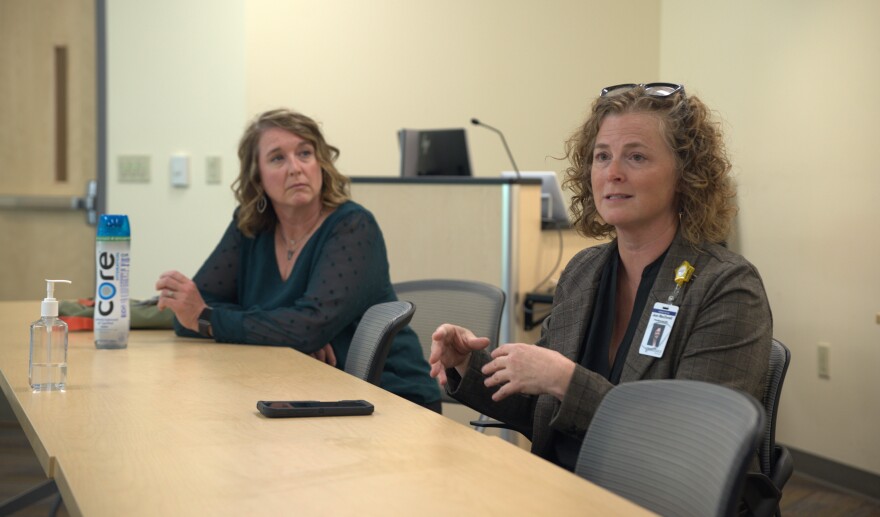
“We are about 15% Medicaid here, so a good number of our patients have services through that program,” she said.
Three weeks before Klobuchar’s visit, on July 4, President Donald Trump signed into law his “big beautiful” budget bill, which included $860 billion in cuts to Medicaid and $500 billion in cuts to Medicare. These cuts start as early as 2026 and will hit hard not only for people relying on these programs but also hospitals in rural areas, Klobuchar said.
“I was not a fan of this bill that just got passed because it's going to make it harder for rural hospitals, harder on Medicaid,” Klobuchar said.
The senator voted against the bill, which passed the Senate 51-50 with a tie-breaking vote by Vice President J.D. Vance on July 1. The bill passed mostly along party lines, with Sens. Susan Collins, R-Maine, and Rand Paul, R-Kentucky, as the only Senate Republicans to vote against the bill.
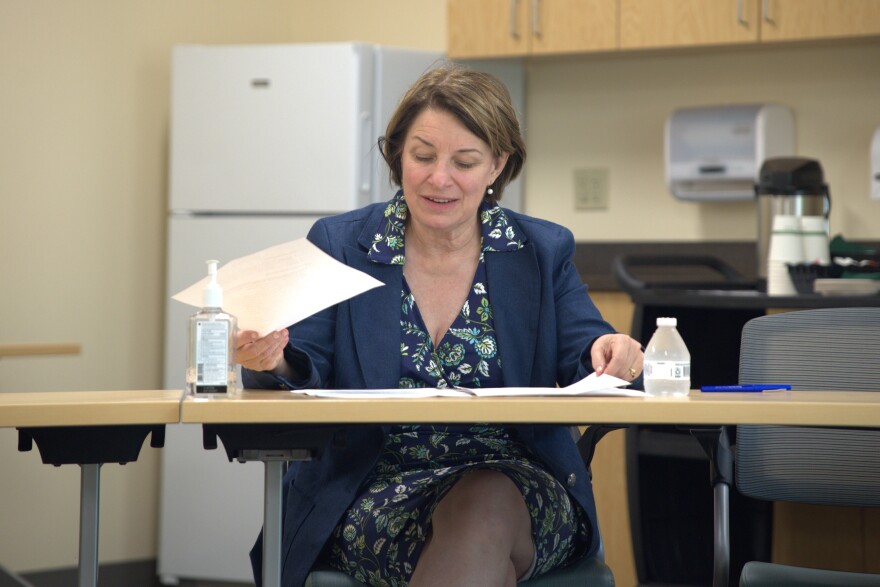
The bill went back to the House of Representatives for a final vote on July 3, passing 218-214 mostly along party lines, with Reps. Brian Fitzpatrick, R-Pennsylvania, and Thomas Massie, R-Kentucky, as the only House Republicans to vote against. Minnesota Congressional District 7 Rep. Michelle Fischbach and District 8 Rep. Pete Stauber voted in favor.
Klobuchar said she would like to reverse the bill’s changes to Medicaid.
“But right now, that thing passed, and my job now is to keep making the case,” she said. “Maybe we need to make some changes because it's going to particularly hit rural areas.”
Klobuchar said she was impressed with Grand Itasca’s growth.
“The fact that this hospital is thriving matters, because it's going to be very hard, this changing situation, on some of the rural hospitals,” she said. “Not to say this doesn't have challenges, but the fact that it's on the forward momentum, it's adding more and more patients — that's a big deal.”
-
Over 100 student-athletes from rural Northern Minnesota will wrestle at the 2026 state tournament in St. Paul, with a strong representation from the north-central region.
-
Conservationists and wildlife enthusiasts are pleading with the public to demand that protections in the BWCAW concerning mining interests stay in place, with a key vote in Congress pending.
-
High school students whose parents or guardians are cooperative members are invited to submit an essay for a chance to attend the Youth Tour in Washington, D.C., June 1-5, 2026.
-
Advocates said housing instability has intensified in recent months amid the presence of U.S. Immigration and Customs Enforcement agents in Minnesota.
-
Most of the petitions were filed by a newly mobilized army of volunteer lawyers with little or no experience with immigration law.
-
To enter the building, visitors and employees need to pass through a body scanner and put large items through a conveyor belt scanner.
-
Democrats are proposing bills targeting issues including federal officers’ accountability, Minnesotans’ right to privacy and preventing federal agents from entering specific areas.
-
Sacred Bundle, a nonprofit through the Leech Lake Band of Ojibwe, is expected to close the sale for the downtown site on Feb. 27, 2026.
-
In December 2025, federal prosecutors announced new charges in a widespread Medicaid fraud investigation, leading to new political turmoil about who was at fault and what should be done.
-
The former lawmaker's trial is slated to begin March 30, 2026. Eichorn was charged with soliciting a minor in 2025 after a prostitution sting operation in Bloomington, where an undercover officer posed as a 17-year-old online.


